Conference Theme
Over the past decades, globalization and other global changes have re-structured relations between countries and regions in the world, and have greatly altered the world geography. Such changes have put forward various problems of local, national or global scales, such as economic imbalance, social fragmentation, political conflicts, and environmental crises. All of these problems threaten the future of the earth. While acknowledging the world’s diversity, geography as a discipline must endeavor to resolve these problems by devising plans for cooperation and symbiotic existence of the different peoples of the world.
An old Japanese proverb (on-ko chi-shin), taken from a Chinese one (wengu zhixin), says that only by exploring the old can one understand the new. We should first understand how traditional ideas, linked to interaction between society/culture and the environment, were formed in different countries and regions. Fortunately, throughout their long histories East Asian countries, including Japan, have fostered a rich wisdom concerning such interaction. Traditional wisdom, in harmony with the environment, remains prevalent. The Regional Conference held in Japan will examine how we can mold the earth’s future through such traditional wisdom and modern knowledge derived from modern geography.
The Kyoto International Conference Center, the venue for the Kyoto Regional Conference (KRC), hosted the 1997 United Nations Framework Convention on Climate Change, which gave birth to the famous Kyoto Protocol. Although the Protocol focused on the prevention of global warming, KRC will aim for a comprehensive examination of various problems in the relationship between society/culture and the environment as well as comprehensive discussions about the earth’s future. Kyoto is furthermore the ancient capital of Japan, and is a metropolis with a long history and one that is richly endowed with a wide variety of fascinating sites from the standpoint of “traditional wisdom.”
We note with deep regret that the Great East Japan Earthquake/Tsunami Disaster on March 11, 2011, and the accident of Tokyo Electric Company’s Fukushima Daiichi Nuclear Power Plant that followed caused very extensive damage. As of early March 2013, there have been over 15,880 confirmed dead and more than 2,660 unaccounted for. It also displaced a significant number of people. This great tragedy will also be investigated carefully in relation to our conference theme.
Keeping the above in mind, we plan the nine keynote speeches in the plenary sessions at 11:45 a.m. – 1:15 p.m. on August 6-8. Furthermore, a book which contains the nine contributions based on these speeches will be publishes from Springer.
|
